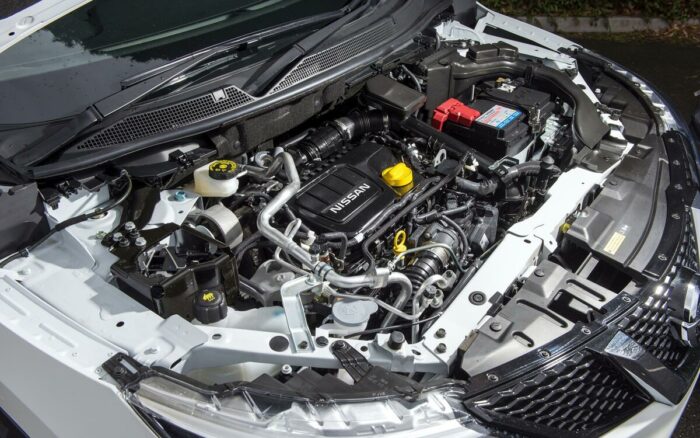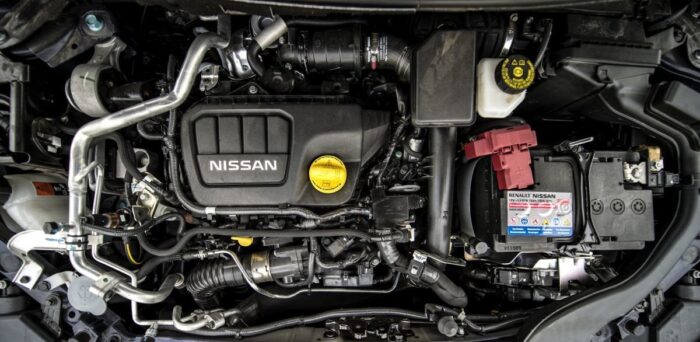Over the past decade, Nissan and Renault have revolutionized diesel engine technology with the creation of the 1.6-liter R9M or 1.6 dCi. Since its debut in 2011, this engine has been used in a variety of popular models, including the Megane, Scenic, Espace, Koleos and Qashqai and X-trail. For Mercedes cars, this renowned engine is also available under its own indices OM622 and OM626 as an auto part replacement.
The R series of diesel engines continues to evolve with innovations such as the powerful R9N model, designed for improved performance and efficient fuel consumption. Ultimately, this highly successful series of engines evidences just how much automobile manufacturers have been able to achieve in terms of modern engineering advancements.
Nissan – Renault R9M 1.6 dCi Engine specifications
Single-Turbo or 1.6 dCi 130
| Configuration |
Inline |
| Number of cylinders |
4 |
| Number of valves |
16 |
| Displacement |
1598 cc |
| Cylinder diameter |
80 mm |
| Stroke |
79.5 mm |
| Power system |
Common Rail |
| Engine power |
130 hp |
| Torque |
320 Nm |
| Compression ratio |
15.4 |
| Fuel type |
Diesel |
| Emissions standard |
EURO 5/6 |
Twin-Turbo or 1.6 dCi 160
| Configuration |
Inline |
| Number of cylinders |
4 |
| Number of valves |
16 |
| Displacement |
1598 cc |
| Cylinder diameter |
80 mm |
| Stroke |
79.5 mm |
| Power system |
Common Rail |
| Engine power |
160 hp |
| Torque |
380 Nm |
| Compression ratio |
15.4 |
| Fuel type |
Diesel |
| Emissions standard |
EURO 5/6 |
Single-Turbo minibus version
| Configuration |
Inline |
| Number of cylinders |
4 |
| Number of valves |
16 |
| Displacement |
1598 cc |
| Cylinder diameter |
80 mm |
| Stroke |
79.5 mm |
| Power system |
Common Rail |
| Engine power |
95 – 115 hp |
| Torque |
260 – 300 Nm |
| Compression ratio |
15.4 |
| Fuel type |
Diesel |
| Emissions standard |
EURO 5/6 |
Twin-Turbo minibus version
| Configuration |
Inline |
| Number of cylinders |
4 |
| Number of valves |
16 |
| Displacement |
1598 cc |
| Cylinder diameter |
80 mm |
| Stroke |
79.5 mm |
| Power system |
Common Rail |
| Engine power |
125 – 145 hp |
| Torque |
320 – 340 Nm |
| Compression ratio |
15.4 |
| Fuel type |
Diesel |
| Emissions standard |
EURO 5/6 |
The dry weight of the R9M engine is 177 kg
Information of the structure of the R9M 1.6 dCi engine
In 2011, another diesel engine jointly developed by Renault-Nissan engineers was presented. This is a 1.6 liter unit with a cast iron block, 16-valve head with hydro-compensators, timing chain drive and Common Rail fuel system from Bosch with piezo nozzles. This engine also received a Start-Stop system and variable capacity oil pump. In addition to the single-turbo 130 hp version, the Twin-Turbo 160 hp version is also available.

The R9M engine number is located on the joint between the block and the head
In 2014, modified versions of this engine for commercial vehicles were presented: 95-115 hp variants with a single turbocharger and 125-145 hp twin-turbo versions. They are still installed on Renault Trafic, Nissan NV300, Mercedes Vito vans, unlike diesel engine for civilian models, which has already given way to a new R9N engine.
R9M Engine
Fuel consumption
The Renault Scenic 1.6 dCi 2014 with manual transmission as an example (l/100km):
| City |
5.2 l |
| Highway |
4.1 l |
| Combined |
4.5 l |
What cars have the Renault / Nissan R9M
Nissan
| Qashqai 1 (J10) |
2011 – 2013 |
| Qashqai 2 (J11) |
2013 – 2018 |
| NV300 X82 |
2016 – … |
| X-Trail 3 (T32) |
2015 – 2018 |
Renault
| Espace 5 (JFC) |
2015 – 2018 |
| Fluence 1 (L38) |
2012 – 2015 |
| Kadjar 1 (HA) |
2015 – 2018 |
| Koleos 2 (HC) |
2017 – 2018 |
| Megane 3 (X95) |
2012 – 2016 |
| Megane 4 (XFB) |
2016 – 2018 |
| Scenic 3 (J95) |
2011 – 2016 |
| Scenic 4 (JFA) |
2016 – 2018 |
| Talisman 1 (L2M) |
2015 – 2018 |
| Trafic 3 (X82) |
2014 – … |
Fiat
| Talento II (X82) |
2016 – … |
Opel
| Vivaro B (X82) |
2014 – 2018 |
Mercedes (OM622, OM626)
| C-Class W205 |
2014 – 2018 |
| Vito W447 |
2014 – … |
R9M diesel engine its pros and cons
Advantages:
- High power for this volume
- And fairly modest fuel consumption
- Excellent durability with proper maintenance
- Available on Renault, Nissan and Mercedes
Disadvantages:
- Not common in our market
- Timing chain stretching already at 150 000 km
- The exhaust valve gets dirty very quickly
- Frequent lubricant leaks

Maintenance of the R9M 1.6 dCi engine
Oil Service
| Interval |
every 20 000 km |
| Oil capacity |
5.9 l |
| Need to change |
6.5 l |
| Type of oil |
5W-30 |
Timing gear
| Timing Chain Type |
Timing Chain |
| Service life |
not limited |
| In practice |
200 000 km |
| At breakage/trans-skip |
Bending of valves |
Valve clearances
| Re-adjustment |
not required |
| Adjustment principle |
hydrocompensators |
Service
| Air filter |
20 000 km |
| Fuel filter |
40 000 km |
| Spark plugs |
120 000 km |
| Antifreeze |
5 years or 100 000 km |
Problems & disadvantages of the двигателя R9M
- The most common service calls are related to the piezo injectors, quick contamination of the EGR valves and particulate filter.
- Cranked liners have been reported on foreign forums from 150,000 km for the engine with two turbines rated at 160 hp.
- Timing chain is designed to last throughout the service life of the engine but there have been reports of stretching up to 150,000 km.
- On some models of Renault, heat exchanger in EGR system often fails leading to exhaust gases leaking into passenger compartment.
- There was a recall campaign to replace exhaust pipe on EGR valve due to it sometimes bursting.
- Common oil leaks include those from under timing chain cover and oil filter housing.
- Manufacturer says engine life is 250,000 km but can easily go up to 400,000 km.


0 Comments